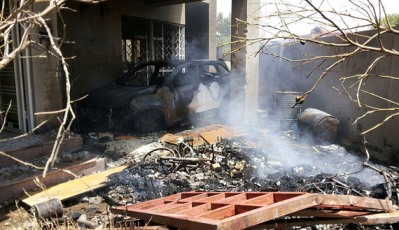by Omar al-Jaffal on 11-09-2014
| BRussells Tribunal |
The complete political process started off wrong.” He said, “The constitution was written in a chaotic manner, making Iraq and its people suffer several crises.”

Smoke rises from debris and a burnt car after a house was destroyed in a bomb attack in Fallujah, July 19, 2014. (photo by REUTERS)
 Sheikh Mohammed al-Bajari, a member of the local council in Fallujah — the city west of Baghdad in Anbar province that has been under heavy shelling and military operations for over 18 months now — said he does not believe “Prime Minister Nouri al-Maliki stepping down and Haider al-Abadi designated to form the new government will solve the Sunnis’ problem with the federal government in Baghdad.”
Sheikh Mohammed al-Bajari, a member of the local council in Fallujah — the city west of Baghdad in Anbar province that has been under heavy shelling and military operations for over 18 months now — said he does not believe “Prime Minister Nouri al-Maliki stepping down and Haider al-Abadi designated to form the new government will solve the Sunnis’ problem with the federal government in Baghdad.”
Bajari described Maliki’s stepping down and Abadi’s designation as “a simple change of faces.”
Both Sunni and Shiite political blocs believe Maliki’s methods of exclusion against Sunnis in Iraq, besides limiting the political decision-making to himself, aggravated the security situation.”
Since last December, Anbar province has been witnessing large-scale military operations, conducted by the army against the Islamic State (IS), after the army had scattered the tents of the protesters who raised their demands to the central government for being subjected to several injustices such as random arrests.
However, Bajari, who does not blame Maliki alone, told Al-Monitor over the phone, “Sunni officials and deputies were the main reason behind the Sunnis’ tragedy and the ongoing war that resulted in hundreds of victims. The complete political process started off wrong.” He said, “The constitution was written in a chaotic manner, making Iraq and its people suffer several crises.”
Bajari said, “The demands of the citizens of Anbar included the annulment of the constitution, writing a new one and restructuring the armed forces on a professional and patriotic basis. We also demanded the annulment of the de-Baathification law and the release of the innocent people who were arrested, as well as the annulment of Article 4 of the Anti-Terrorism Law. These demands require a firm decision; Abadi will not be able to achieve this.”
“Replacing Maliki with Abadi, or anyone else, is not going to solve the tragedy suffered by Iraqis in general, and Sunnis in particular,” said Bajari, stressing, “There should be a trial against Maliki and his entire political system for all the crimes he committed against the Iraqis.”
Another member of Fallujah's local council, Muthni al-Aani, seems rather more flexible than Bajari. Aani thinks there should be negotiations with the government, but limits these negotiations to whom he called “rebels.”
He told Al-Monitor over the phone, “Only the rebels have the right to negotiate with the government. They are the ones leading the revolution, and they will decide whether or not to negotiate with the government.” He said, “Generally speaking, as local officials, we have witnessed the bloodshed and crimes committed by Maliki against Sunnis. Yet, neither Abadi nor any other politician, whether Sunni or Shiite, objected to Maliki’s unspeakable crimes against humanity.”
A member of the general military council for the tribal rebels in Anbar, who wished to remain anonymous, told Al-Monitor, “The military council for tribal rebels in Anbar is waiting for an initiative showing the new prime minister’s goodwill. This initiative should include withdrawing all army divisions, militias and SWAT forces from Anbar completely. It should also grant all displaced families and families of the martyrs and wounded compensation for all the psychological, material and moral sufferings they have endured for the past months.”
He added, “One of the main conditions for dialogue with Abadi is the trial of Maliki along with his complete political system, as well as its security, military and political leaders in all of Anbar, in addition to every individual who had anything to do with Maliki’s war against Anbar. Sunnis must be granted all the rights they were demanding during the protests that took place before the military operations. … If Abadi makes the initiative showing his goodwill, the military council will also show its goodwill through its own initiative.”
Political analyst Ali Ismail Dalimi who lives in Anbar province told Al-Monitor, “Sunnis do not see a solution to their crises in replacing Maliki with a new prime minister. … The Sunnis are a group of tribal sheikhs, rebels and citizens who are determined to start restructuring the political process. If the constitution is not rewritten from scratch, the Sunnis will never stop their revolution.”
He said, “This is the actual reality. Thousands of orphans and widows and thousands of displaced citizens will not accept that the situation goes back to the way it was before the revolution. They will not accept a political system similar to Maliki’s system and that of wrongful methods.”
Omar al-Jaffal is an Iraqi writer and poet. He is an editor of Bayt and Nathr, two intellectual magazines that are published in Iraq. He is also the chief editor of Al-Aalam al-Jadid, an electronic newspaper.
No comments:
Post a Comment